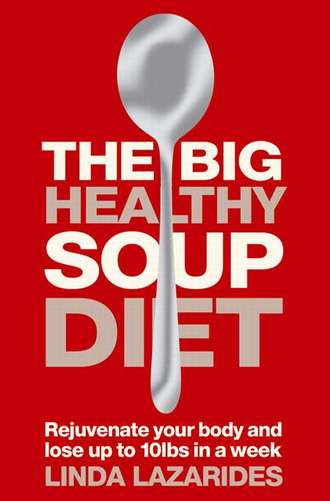
Полная версия
The Big Healthy Soup Diet: Nourish Your Body and Lose up to 10lbs in a Week
Another pitfall is to promise yourself that you will make up for unscheduled binges at a later date. Believe me, you won’t! The reason why you got overweight in the first place is that your favourite foods (usually sugar-rich foods) were just too addictive. Addictive behaviour is a slippery slope, and few people recognize it in themselves. If you understand this right at the start, you will have a better chance of keeping your beautiful new figure.
Soup is a fantastic aid to keeping your target weight. To help maintain your ability to resist snacking between meals, just continue to start each meal with a bowl of soup.
SKIN HEALTH
I have already mentioned that eating too many foods high in visible and especially invisible fats plays havoc with your skin (see page 6). Not only do pores get clogged, but blackheads form and greasiness develops. Fat slows down your blood circulation, and this reduces the supply of vitamins and oxygen to cells that make collagen. These cells may lose their efficiency and slow down collagen production. The less collagen you make, the more likely is the appearance of premature ageing. Not only does the Big Healthy Soup Diet have a carefully controlled fat and oil content, it is also very rich in nutrients which nourish your skin cells.
Dehydration from drinking too much tea, coffee and alcohol also harms your skin. Another benefit of soup is to give you plenty of liquid to help hydrate you.
Rich in dietary fibre, the Big Healthy Soup Diet also encourages regular, healthy bowel motions. This helps you eliminate toxins and soluble wastes, which could otherwise be absorbed from your intestines into your blood. Such toxins overload your kidneys and cause the typical sallow complexion of people who suffer from long-term constipation.
AMAZING DISCOVERIES ABOUT SOUP
2005 Study at Purdue University, Lafayette, USA
Solid and liquefied versions of identical foods high in protein, fat or carbohydrate (containing the same number of calories) were given to 13 male and 18 female volunteers. Beverages were also tested. The participants completed questionnaires on mood, appetite and psychological state. Eating soup led to reduced hunger. Overall calorie consumption tended to be lower on days when soup was eaten compared with days on solid foods and beverages. Beverages had the least effect on hunger reduction. The researchers concluded that soup may help to reduce appetite.
Mattes R. Physiol Behav. 2005 Jan 17;83(5):739-47.
2003 Study at the New York Obesity Research Center, St. Luke’s-Roosevelt Hospital Center, New York, USA
Cholecystokinin (CCK) is a gut hormone that plays a role in satiety (feeling full). Levels of CCK rise after a meal, and this helps us to feel full. The researchers wanted to test whether soup quenches appetite by stimulating higher levels of CCK. They measured plasma CCK levels in eight healthy, non-obese men and women before and after eating 800 grams of tomato soup, followed 30 minutes later by 300 grams of a yoghurt shake. Appetite ratings were compared with CCK levels. It was found that eating soup significantly increased plasma CCK levels within 30 minutes in all subjects combined. Interestingly, the women’s average CCK levels were significantly higher than the men’s. The researchers concluded that eating soup may be especially beneficial for women who want to lose weight.
Nolan L.J. and colleagues. Nutrition. 2003 Jun;19(6):553-7.
1999 Research at the Pennsylvania State University, USA
Research has shown that adding water to foods can lead to reductions in the number of calories consumed. This study aimed to find out how water affected appetite when served separately with food or incorporated into food. Seventeen minutes before lunch, 24 women were fed one of three starters: (a) chicken-rice casserole, (b) chicken-rice casserole served with a glass of water, (c) chicken-rice soup. All the starters contained the same number of calories. The soup contained the same ingredients (type and amount) as the casserole that was served with water. The researchers found that turning the casserole into soup by adding water to it greatly increased fullness and reduced hunger. The equivalent amount of water served in a glass with the food did not aid fullness. Calorie intake at lunch was much less after the soup compared with after the casserole, whether water was served with the casserole or not. The test subjects did not compensate at dinner for eating less lunch.
Rolls B.J. and colleagues. Am J Clin Nutr. 1999 Oct;70(4):448-55.
1998 Study at the Nutritional Neurobiology Laboratory, EPHE, Paris, France
Twelve lean and ten overweight young men were given a starter consisting of (a) vegetables and water, or (b) pureed and strained vegetable soup, or (c) chunky vegetable soup. The soups were of the same composition and volume; only the size of the solid pieces and the distribution of nutrients between solids and liquid were different. All the starters were found to reduce hunger and subsequent food intake, but the chunky soup had the most pronounced effect. The researchers concluded that there may be special benefits in using chunky soups as part of a weight-loss programme.
Himaya A. and colleagues. Appetite. 1998 Apr;30(2):199-210.
1994 Study at the Centre for Human Nutrition, University of Sheffield, UK
The consumption of dietary fibre is known to prolong the feeling of fullness, but it was not known how. In this study on eight male volunteers, three per cent guar gum (a type of mucilage fibre similar to psyllium husks) was added to high-fat and low-fat soups. Guar gum delayed the emptying of the stomach for both types of soup, but the delays in the return of hunger and decline of fullness were far greater for the fatty soup. The fibre appeared to work by slowing absorption and prolonging the presence of nutrients in the intestines.
French S.J. and colleagues. Am J Clin Nutr. 1994 Jan;59(1):87-91.
1990 Study at Johns Hopkins University School of Medicine, Baltimore, USA
Three different starters—tomato soup, melon or cheese on crackers, all with the same number of calories—were served just before the main course. Soup was found to reduce the amount of food eaten in the second course much more than the other starters. The researchers concluded that eating soup could be beneficial in weight-reduction programmes.
Rolls B.J. and colleagues. Appetite. 1990 Oct;15(2):115-26.
We all know that you are what you eat, and how important it is to eat vegetables. But that’s not always as easy as it sounds. Some people find vegetables too bland, and children may refuse them altogether. But do you know anyone who doesn’t like soup? Soup can help you and your loved ones reach a ripe old age without too many visits to the doctor. A single portion of soup can hold a lot of power foods which protect you with antioxidants, flavonoids, essential fatty acids and dietary fibre. For instance, a soup made with tomatoes, beans, garlic, onions, parsley and shredded dark green leaves (cabbages, collards or spring greens, Brussels tops etc.) can:
Help to prevent heart disease and cancers (tomatoes, parsley, green leaves)
Lower cholesterol (beans and garlic)
Fight viruses (onions)
As regards preparing such a soup, the only limit is your imagination!
Add lemon juice if you like your soup tart and zingy
Or some Tabasco sauce or cayenne pepper if you prefer it spicy
Or purée the soup and add a teaspoon of cream and some Parmesan cheese
Can something so delicious really prevent ill-health? Don’t take my word for it; have a look at the research summaries at the end of this chapter (page 46). They are just a few examples of the many scientific studies that prove the tremendous health benefits of eating fruit and vegetables. They’re so much easier to eat when you make them into soup! All the studies come to the same conclusion: the more fresh fruit and vegetables you eat, the less likely you are to get clogged arteries, high blood pressure, heart attacks and cancers. It’s as straightforward as that. Once we had to take it all on trust that these major health problems (and the disabilities they bring) were food-related. Now it is no longer just naturopaths and alternative medicine specialists who are telling us these things, but doctors and scientists as well.
Next we need to ask ‘How much is enough?’ When I mention green vegetables, for instance, so many people say ‘I do eat greens so I must be okay.’ Then I discover they last ate them several weeks ago. This is actually a low frequency and puts the person in a high disease-risk category. If you really want these power foods to protect you, consider eating them every day. As you can see from the summaries on page 46, researchers recommend consuming 400-600 grams (1-1 ½ lbs) of fruit and vegetables per day. It’s so easy when you add them to soup!
Good soups to start with are Soup 1: Apple, almond and cardamom soup with sheep’s yoghurt, Soup 13: Traditional Ukrainian borscht, and Soup 34: Brown lentil soup with roasted sweet peppers and apricots. Or just work your way through the whole book to discover your favourite recipes, and put them on your daily menu!
POWER SOUPS FOR STAYING HEALTHY
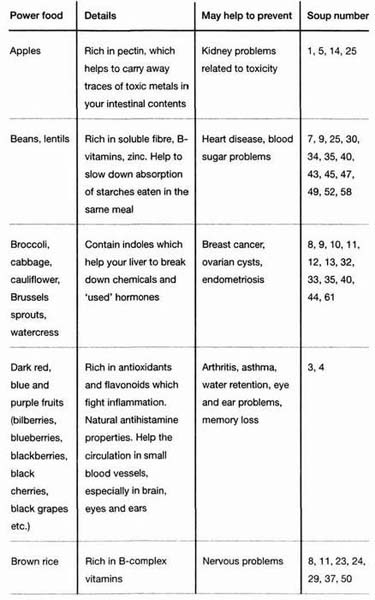
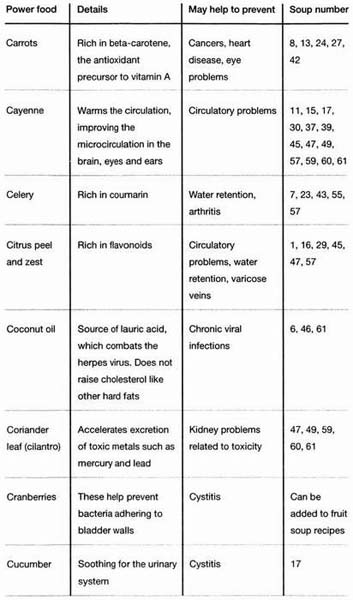
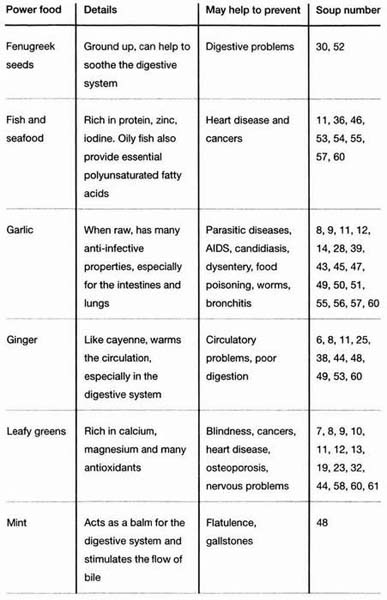
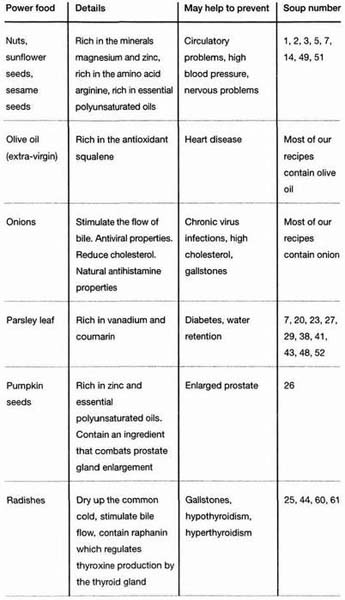
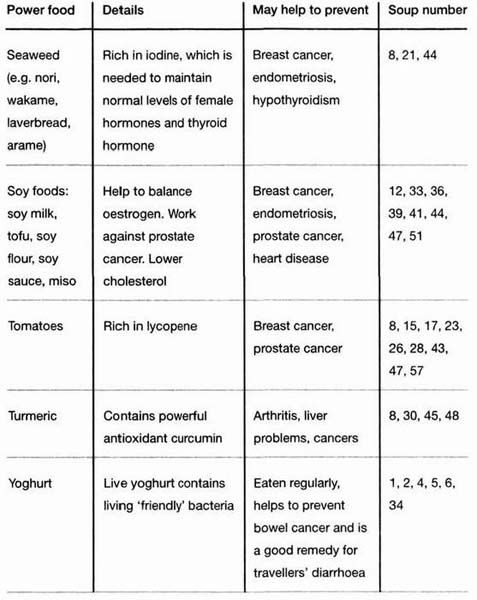
Of course if you smoke, take no exercise, eat too much salty, fatty or sugary food and drink too much alcohol, then it is much harder for good foods to protect you. After all, no matter how much good quality engine oil you put in your car, it will still break down if you put the wrong fuel in the tank!
FOODS THAT NEED TO BE RATIONED
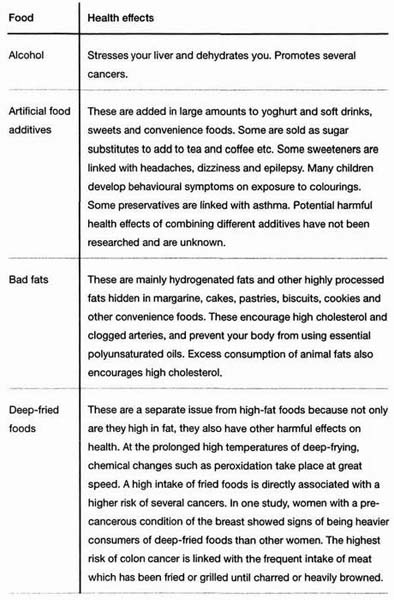
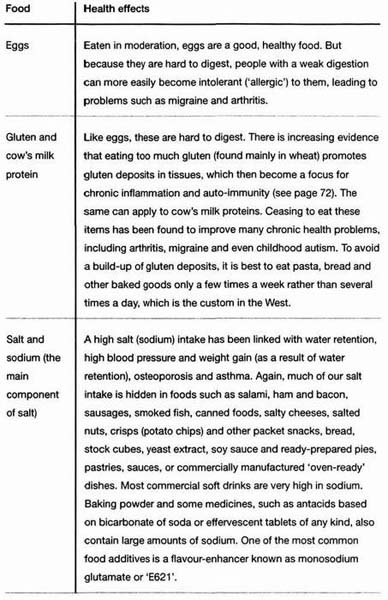
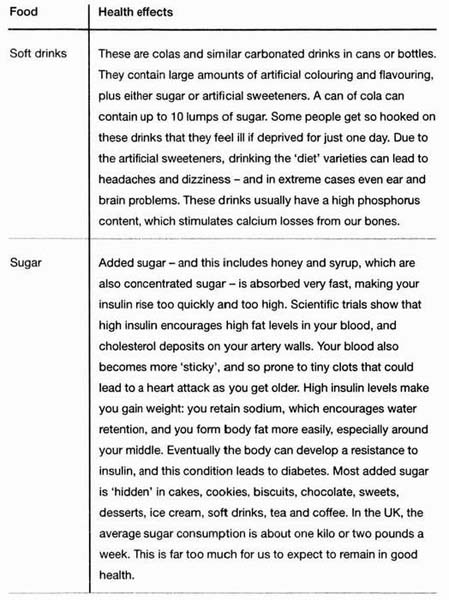
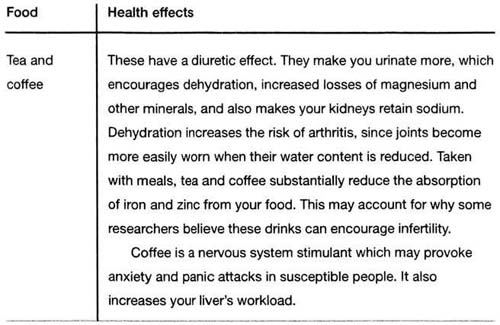
Don’t be dismayed at this long list. Of course you can still be healthy without giving up all these foods! Some people even feel guilty if they buy butter for their children and eat some of it themselves. That is a natural reaction, but it is actually a huge over-reaction. Rationing is recommended – total deprivation is not! I eat most of these foods myself, but as occasional treats rather than as staple parts of my daily diet.
The easiest way to ration is to consume so much of the right foods that you don’t feel as much need for the wrong ones. If you have a big problem with craving sweets, chips, fries and pastries, try eating a bowl of home-made soup first. It is one of the best ways to take the edge off cravings.
WE DO NEED TO EAT SOME SUGAR EVERY DAY, DON’T WE?
This is not at all true as all the carbohydrate you eat gets turned into sugar by your body. If you still need more you can turn protein and parts of the fat molecule into sugar. To get enough energy there’s no need to consume any sugar or sugary foods at all.
AMAZING FOOD AND HEALTH DISCOVERIES
2003 Article from the Division of Preventive Medicine, Harvard Medical School, Boston, Massachusetts, USA
Heart disease is still the leading cause of disease and death worldwide. Statistics show that populations who consume more fruits and vegetables often have a lower risk of developing heart disease, high blood pressure and diabetes. Recent large research studies show that the higher the fruit and vegetable intake, the lower the rate of heart attacks and strokes. Many nutrients in fruits and vegetables, including fibre, potassium and folic acid, help to reduce the risk. The low glycaemic index and calorie content of these foods may also play a part. In view of these benefits, the researchers believe that not enough effort and resources are currently being devoted to encouraging dietary changes in Western society.
Bazzano L.A., Serdula M.K., Liu S. Curr Atheroscler Rep. 2003 Nov;5(6):492-9.
2004 Article from the UCLA Center for Human Nutrition, Los Angeles, USA
An intake of 400-600 grams (1-1 ½ lbs) of fruits and vegetables per day brings lower rates of many common forms of cancer. Diets rich in plant foods also bring a lower risk of heart disease and chronic diseases of ageing. Red foods such as tomatoes contain lycopene, which has special benefits for prostate health. Green foods, including broccoli, Brussels sprouts and kale, contain glucosinolates, which protect against cancer. Garlic and other foods in the onion family contain allyl sulphides which may inhibit cancer cell growth. Substances in green tea and soybeans also have health benefits. Everyone would potentially benefit from consuming one serving of each of the seven colour groups daily. The United States National Cancer Institute and American Institute for Cancer Research already recommend five to nine servings of fruit and vegetables per day.
Heber D.J Postgrad Med. 2004 Apr-Jun;50(2):145-9.
2004 Article from the Department of Cardiology, All India Institute of Medical Sciences, New Delhi, India
The role of diet and nutrition in heart disease and stroke has been extensively researched. Enough evidence is available from population studies to show that the right diet can reduce the risk of heart disease. Trans-fats and saturated fats increase the risk, while polyunsaturated fats are protective. Sodium raises the blood pressure, while foods rich in potassium reduce the risk of high blood pressure and stroke. Regular frequent consumption of fruits and vegetables protects against high blood pressure, heart attack and stroke. It is time to translate this knowledge into government policies that promote healthy diets and discourage unhealthy diets.
Srinath Reddy K., Katan M.B. Public Health Nutr. 2004 Feb;7(1A):167-86.
1994 Article from Loma Linda University, California, USA
Recent research shows that frequent consumption of nuts offers protection against heart attacks. Nuts help to lower cholesterol, and also contain nutrients which protect in other ways.
Sabate J., Fraser G.E. Curr Opin Lipidol. 1994 Feb;5(1):11-6.
2004 Research Study from the London School of Hygiene and Tropical Medicine, UK
South Asian women from India eat a diet rich in phyto-oestrogens (plant) – not from soy foods but from beans, lentils and vegetables. The dietary intake of phyto-oestrogens was compared between 240 South Asian women living in England with breast cancer, and 477 similar women without breast cancer. It was found that among the women with the highest intake of phyto-oestrogens there were only half as many cases of breast cancer as among those with the lowest intake. The researchers concluded that phyto-oestrogens help to protect against breast cancer.
dos Santos Silva I., Mangtani P. and colleagues. Cancer Causes Control. 2004 Oct;15(8):805-18.
2004 Article from the Hallelujah Acres Foundation, Ellensburg, Washington, USA
Scientists estimate that 30-40 per cent of all cancers can be prevented by lifestyle and dietary measures alone. Consuming too much low-fibre food and red meat, and a poor balance of essential polyunsaturated fats, increases the risk of developing cancer. Consuming abundant fruits and vegetables lowers cancer risk. Garlic, onions and cruciferous vegetables such as broccoli and Brussels sprouts are especially beneficial. Nutrients that protect against cancer include selenium, folic acid, vitamin B12, vitamin D, chlorophyll, and antioxidants such as carotenoids. Taking supplements of digestive enzymes and probiotics is also helpful. Individuals who follow these guidelines are likely to have a 60-70 per cent lower risk of developing breast, colon or prostate cancer, and also a reduced risk of contracting other forms of cancer.
Donaldson M.S. Nutr J. 2004 Oct 20;3(1):19.
2005 Research from the American Cancer Society, Atlanta, Georgia, USA
In this study, 148,610 adults aged 50-74 were asked to provide information on their consumption of meat in 1982 and again in 1992. They were observed from 1992 to 2001 and, during this time, 1,667 of them developed cancer of the colon or rectum (colorectal cancer). Those with colorectal cancer were found to be the highest long-term consumers of red meat and processed meats. The researchers concluded that prolonged high consumption of red meat and processed meats may increase the risk of cancer in the lower part of the large intestine. These findings have also been confirmed by other researchers.
Chao A., Thun M.J. and colleagues. JAMA. 2005 Jan 12;293(2):172-82.
2004 Research from Clemson University, SC, USA
Plants are known to contain anti-cancer compounds. The initial step in the formation of a cancer is damage to a cell, which leads to a mutation in one of its genes. Fresh juices and extracts from strawberries, raspberries and blueberries were evaluated for their ability to inhibit mutations induced by mutagens such as benzopyrene – a mutagen found in charred meat. The researchers found that juice from strawberries, raspberries and blueberries significantly inhibited the action of mutagens.
Hope Smith S., Tate P.L. and colleagues. J Med Food. 2004
Winter;7(4):450-5.
2004 Research from Michigan State University, USA
Anthocyanidins are pigments found in bilberries, blueberries, black grapes and other dark blue, dark red and purple fruits. On testing, these researchers found that they have a significant anti-cancer effect.
Zhang Y., Vareed S.K., Nair M.G. Life Sci. 2005 Feb 11;76(13):1465-72. Epub 2004 Dec 13.
1997 Research from Andrews University, Michigan, USA
A diet rich in plant foods contains many substances with health-protective benefits. Nuts, whole grains, fruit and vegetables contain phenolic compounds, terpenoids, pigments and other natural antioxidants that help to protect against and/or treat chronic diseases such as heart disease, cancer, diabetes and high blood pressure. The foods and herbs with the highest anti-cancer activity include garlic, soybeans, cabbage, ginger, liquorice, and cruciferous vegetables such as broccoli and cabbage. The phytochemicals in whole grains reduce the risk of heart disease and cancer. In addition to providing an ample supply of vitamin C, folic acid, potassium and pectin, citrus fruits also contain a host of active phytochemicals.
Craig W.J. J Am Diet Assoc. 1997 Oct;97(10 Suppl 2):S 199–204.
As we get older , the vitality of our digestive system often decreases. Food is less easily digested, absorbed and assimilated into cells. Your whole body is made from cells. While the vitamin and mineral levels in our food remain the same, amounts of nutrients getting into our cells may decrease. Depending on which types of cells are affected, problems can start to develop with hormones, energy, bones, joints, nervous system, immune system or circulation. These problems are often put down to the ageing process. But the good news is that ageing cells can be rejuvenated.
Cells are very much like miniature plants. Give them enough oxygen and nutrients, and help them to get rid of their waste products quickly, and they will be able to regenerate themselves and work more efficiently. The result is better energy, more balanced hormones, stronger bones and joints, and a healthier circulation and nervous system.
If by now you’re guessing that the best way to rejuvenate your body is with soup, you are not far wrong. With less efficient digestion and absorption, it’s important to reduce the load on your digestive system while increasing the nutrient density of what you eat. That means eating foods with a high ratio of vitamins, minerals and flavonoids compared with the total number of calories.
The most high-calorie foods are those high in sugar, fat and starch. Soup, on the other hand, quickly fills you up without containing added sugar, and with only a little fat (oil) and starch in the form of rice or potatoes. The rest is water, fibre, vitamins, minerals and protein. The fibre content helps to sweep out wastes which might otherwise be absorbed into your blood and end up burdening your kidneys. All these qualities make home-made soup a naturally rejuvenating food.
To increase the nutritional value of soup even more, you can enrich it with juice extracted from vegetables such as broccoli stems, carrots, tomatoes, radishes and celery. Consumed on a regular basis, soup made in this way helps your brain, nervous system, liver, kidneys, circulation and glands to work better. With a healthy circulation, your memory, energy, eyes and ears stay youthful, helping you to continue enjoying life well into old age. Cells discharge their wastes more easily, water retention recedes, and all sorts of ailments begin to disappear. Add home-made chicken or fish stock or broth and you can even help to rebuild joints and cartilage. Stock from boiled chicken and fish bones is rich in glucosamine, which scientists have successfully used to treat long-term arthritis and other inflammatory conditions.
MEDICINAL FOODS
Countless other ingredients with medicinal effects can easily be added to soup in truly delicious combinations. Ranging from coriander leaf (cilantro) to ginger, radishes, garlic and Brussels sprouts, these mouth-watering ingredients will make you feel as if you are in a top-class restaurant rather than taking your medicine. In this section we will look at how different soups can treat as well as prevent problems relating to the following body systems:


